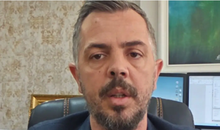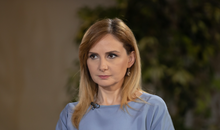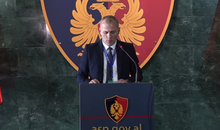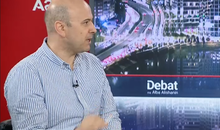
 Flash News
Flash News
Korça/ 40-year-old man jumps from fifth floor balcony, in critical condition
Croatia restores compulsory military service
Illegal constructions in Theth, Manja demands disciplinary proceedings against prosecutor Elsa Gjeli
Details from the murder of Renis Dobra, the perpetrators came with 2 Range Rover cars from Rrëshen
The Supreme Court left him in prison, Meta addresses the 'Constitution'
Experts: Russian disinformation campaigns create a climate of chaos

To the audience of Polish public radio 'Polskie Radio', the main headlines on its website seemed strange: "Unacceptable truth: EU will do without Poland" and "Ukraine will remain outside the EU" ".
The pro-Russian and Eurosceptic theories did not match the mainstream radio reporting. But at first glance, her website looked genuine.
From a careful look at the page, one thing stood out: the website address was polskieradio.icu. The real address of the 'Polskie Radio' website is polskieradio.pl. Pro-Russian theories were placed on the cloned Russian website to mislead readers.
The incident, discovered in April, is part of a wider effort to use fake websites over the past two years to run a "continuous" disinformation campaign, according to an article published on the institute's website. International Press Association, based in Austria, which is also signed by three other European organizations that protect press freedom. These organizations say that Russian agents are creating fake news sites on the Internet that impersonate reputable sources of information and post fake news on these sites.
"It's hard to tell that it's a fake website, that's why it's working," says Camille Magnissalis, who monitors press freedom violations for the European Federation of Journalists (EFJ). "If you are not aware, it is very easy to be deceived".
The US Department of Justice announced in September that such websites are part of "malicious influence campaigns orchestrated by the Russian government" , known colloquially as "Doppelganger", a word borrowed from the German language to describe an individual which is almost identical to another.
The State Department during that period announced the "seizure in progress" of 32 Internet addresses that were used in such campaigns.
The websites imitate the sites of reliable European media, but actually deceive readers with malicious news and propaganda. Such content is often distributed on social media through advertisements or accounts created by computer programs (bots).
"They are often political issues because their goal is to influence people ," expert Magnissalis told VOA. "Ultimately, these stories integrate into the news landscape and have impact."
The Media Freedom Rapid Response (MFRR) consortium details the Russian disinformation campaign in its report for the first half of 2024, which analyzes media content. Two European press rights organizations, EFJ and IPI, are part of this group.
In 2023, fake websites were mostly filled with fake writing, according to the MFRR report. This year, most attacks have been created using artificial intelligence, whether through manipulated 'deepfake' photos or fake audio recordings of well-known journalists.
Such content undermines trust in the news and creates a "climate of chaos" for European news readers, according to the report.
The addresses of these fake websites are purchased through cryptocurrency transactions, hiding the real identity of the buyer. Digital accounts for cryptocurrencies were linked to Russia, according to the IPI report.
"They are using sophisticated tactics to mask the fact that they are trying to misinform everyone," says official Karol Luczka from the IPI's Eastern Europe branch. "They try to hide the fact that Russia is behind these efforts."
This Russian operation has targeted Ukraine, Poland and Germany. Even France before the presidential elections this summer was his target. A website imitated the website of the French newspaper Le Monde.
The Russian Embassy in Washington did not respond to VOA's request for comment on these developments.
Although the Russian campaign is widespread throughout Europe, the fake websites first appeared in Ukraine in an attempt to manipulate public opinion about Russia's war in Ukraine, according to expert Luczka.
According to him, the fake news on these websites was mainly aimed at advancing three Russian theories: that Ukraine is losing the war, that Ukraine is running out of resources, or that the Ukrainian government is corrupt.
Before 2022, Russia mainly published disinformation in the Russian language. The actual campaign of impersonating websites of respected media is done in the language of the country being targeted. This form makes the writings more reliable for the public, says expert Luczka for the Voice of America.
"Russian disinformation tactics are getting sharper and more refined ," he says. "This means that they are becoming even more efficient, unfortunately."
The social platform Facebook has played a key role in the spread of these websites and their false information, Mr. Luczka says, adding that the platform is where Ukrainians read most of their news.
About 54% of the Ukrainian population use the Facebook platform, according to data collected by the World Population Magazine.
This presents a challenge for large technology companies such as Meta, owner of the Facebook platform, according to expert Magnissalis from EFJ. These platforms have a responsibility to monitor disinformation posted on them, she says, including that coming from Russian actors.
"They create fake accounts and spread the writing through these websites all over the place," she says. "It is not a new method, but it is problematic"./ VOA
Latest news


Malltezi: SPAK admits, we are in a process that began with Balla's false report
2025-07-10 22:34:16

Si të çliroheni nga bllokimet emocionale me anë të ushtrimeve
2025-07-10 21:57:24

Lala: Veliaj wanted to return as mayor
2025-07-10 21:40:46

VIDEO/ Brawl in Bolivian parliament, deputies physically clash
2025-07-10 21:20:30


Albania experienced one of the longest heat waves of the last decade
2025-07-10 21:01:09

The Government approves new procedures for declaring residence in e-Albania
2025-07-10 20:39:32

Koka: Northerners will not forget Edi Rama's racist operation in Theth
2025-07-10 20:18:24
The 3 zodiac signs that will be most affected by the 'Full Moon' of July 10
2025-07-10 20:04:49
New director of the National Center of Cinematography appointed
2025-07-10 19:51:12
Korça/ 40-year-old man jumps from fifth floor balcony, in critical condition
2025-07-10 19:40:19
'Tired Woman'/ The Syndrome That Affects Thousands of Women Every Day
2025-07-10 19:34:02
Jane Birkin's original Hermès bag sells for $10 million
2025-07-10 19:26:22

Britain-Ukraine agreement signed for 5,000 Thales missiles
2025-07-10 19:00:25
Fire in Zvërnec, flames endanger two hotels
2025-07-10 18:57:19
Croatia restores compulsory military service
2025-07-10 18:39:01
Spahia: The great truth of the strong accusation of the residents of Theth
2025-07-10 18:35:07


The Supreme Court left him in prison, Meta addresses the 'Constitution'
2025-07-10 17:57:21
New punishment with 'new' regulations
2025-07-10 17:54:46
EU translator fired over fears for Zelenskyy's safety
2025-07-10 17:45:37
'You are a policeman, but not God, take my soul', protest for Agon Zejnullahu
2025-07-10 17:41:21


Video/ Rama repeats the scenario, kneels before Meloni again
2025-07-10 16:56:31
He set fire to a plot of olive trees, 50-year-old man arrested in Shijak
2025-07-10 16:46:19

Rubio: US and Russia have exchanged new ideas for Ukraine peace talks
2025-07-10 16:36:20
Death of 27-year-old, Lipjan Police Commander Resigns
2025-07-10 16:21:28
Video/ An apartment burns in Tirana near the New Bazaar
2025-07-10 16:09:36


Jensila lights up the internet with her birthday greetings to Ledri
2025-07-10 15:42:08
They're full of pesticides! List of 12 products we need to be careful of
2025-07-10 15:31:04

Worker falls from scaffolding in Shëngjin, urgently sent to Trauma
2025-07-10 15:11:03
Malltezi: Within one day they seized my accounts, properties and shares
2025-07-10 15:01:23
EU: Israel has agreed to more aid to Gaza
2025-07-10 14:55:19


Murder of Reni Dobra, 23-year-old's vehicle pulled from the water
2025-07-10 14:29:23
Trump's tariffs on Brazil raise coffee prices
2025-07-10 14:16:07
Ursula von der Leyen survives no-confidence vote
2025-07-10 14:04:27


Fire in Lezha, flames near electrical substation
2025-07-10 13:32:24
Residents clash with police in Theth, a woman faints
2025-07-10 13:24:38
"Rama and Xanun"
2025-07-10 13:15:46

Zodiac signs most likely to get divorced in July 2025
2025-07-10 12:45:51
A scapegoat for an illegitimate Republic
2025-07-10 12:35:02
"He has devastated his own nation"/ Berisha: Rama imprisons his opponents!
2025-07-10 12:26:54

Albanian man injured with knife in Italy
2025-07-10 12:08:55






23-year-old in Mat drowned with rope, 4 suspects are being held
2025-07-10 10:58:53

After the dismissals, the new director of the Shkodra Police is appointed
2025-07-10 10:30:10
BIRN: Rama's action for public spaces, a repeated spectacle
2025-07-10 10:29:11
Action in Theth, Shkodra Police leaders dismissed
2025-07-10 10:16:28
Fatal accident on the Tirana-Durres highway
2025-07-10 10:01:58
The incinerator does not exist, but the government continues to increase funds
2025-07-10 09:51:45
Albania is aging at a rapid pace! 30% of the population is over 60 years old
2025-07-10 09:46:23
End of an era, Modric says 'goodbye' to Real Madrid
2025-07-10 09:36:09
Mount Dukat has been on fire for 6 days, residents request air intervention
2025-07-10 09:27:24

"Poverty on the rise"/ DW: Many people in Germany are not getting paid
2025-07-10 09:08:06
Horoscope, what do the stars have in store for you today?
2025-07-10 08:51:59




The scorching heat returns, the thermometer climbs to 40°C
2025-07-10 07:58:52
Morning Post/ In 2 lines: What mattered yesterday in Albania
2025-07-10 07:46:35
Tourist operator in Theth: They are demolishing our houses without warning
2025-07-09 22:54:57

Trump and Israeli commander warn: Gaza ceasefire could be near
2025-07-09 22:13:21
Fire in Elbasan Landfill, pedagogue: It is a cancer and environmental crime
2025-07-09 21:54:47


Dangerous summer, number of snake bites increases
2025-07-09 21:22:13
Berisha appeals again: Stop state terror against the residents of Theth!
2025-07-09 21:15:36
'Kissing disease' virus linked to several forms of cancer
2025-07-09 21:04:44
Malltezi confesses after release: Justice has become a political weapon
2025-07-09 20:51:48
Vokshi: Albania's EU integration has stalled due to lack of free elections
2025-07-09 20:37:21
